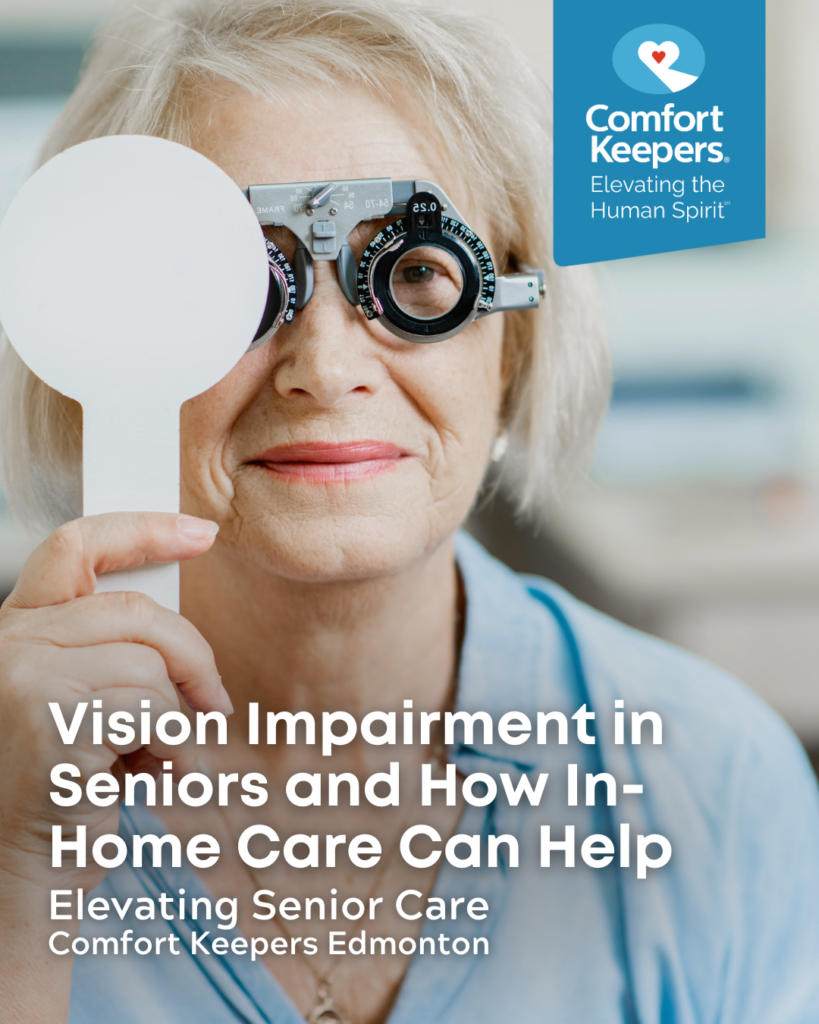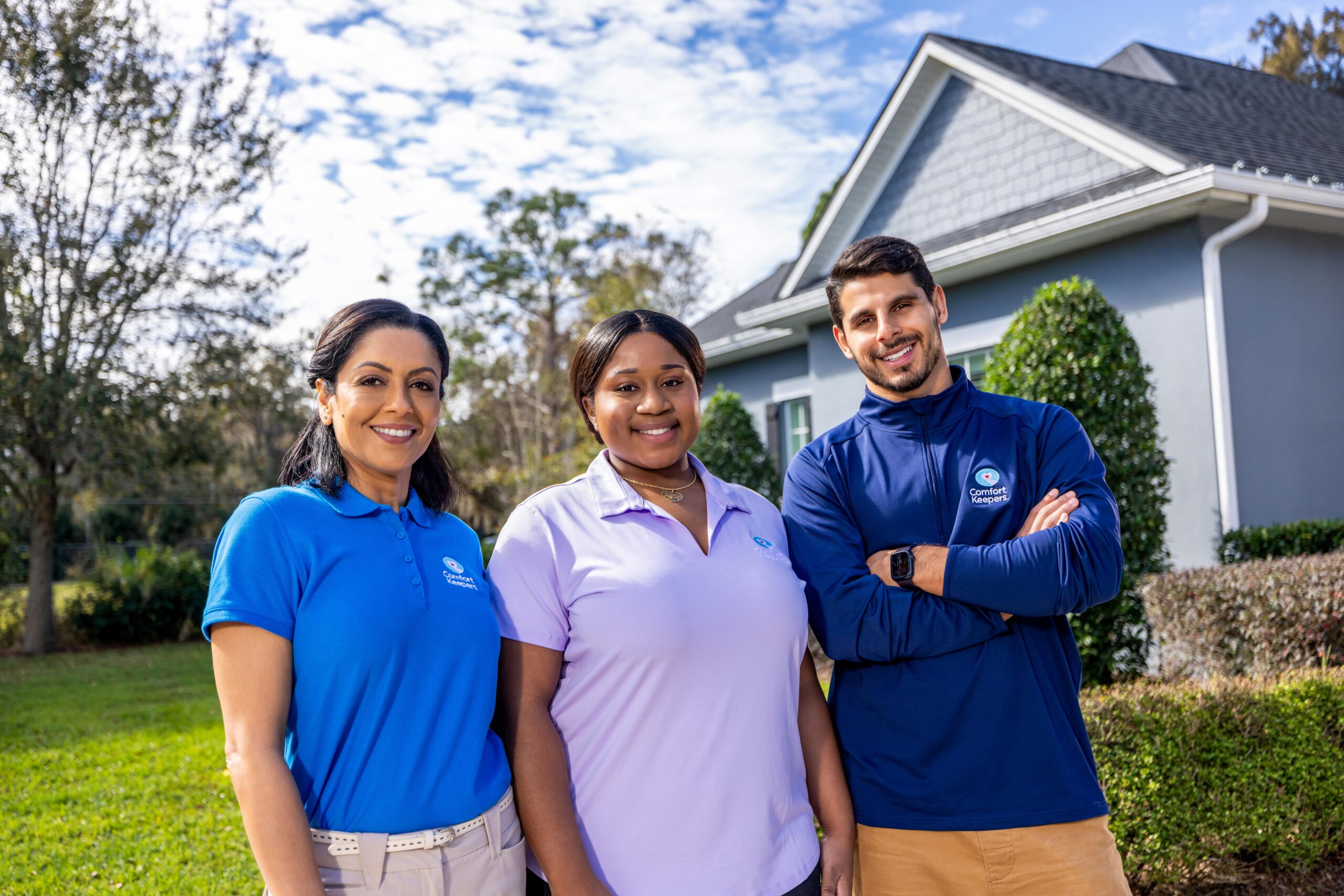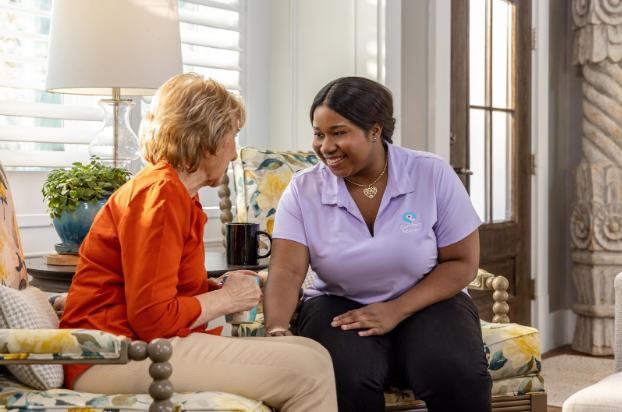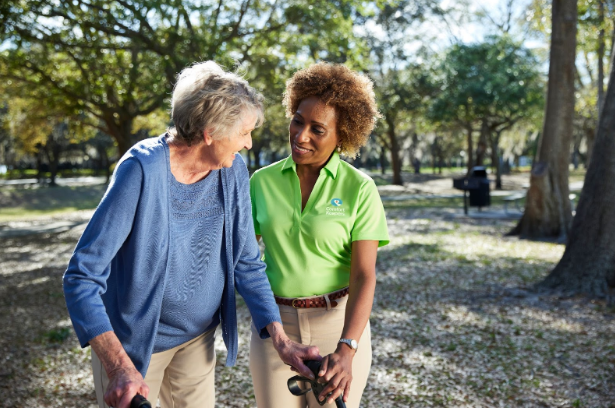Vision Impairment in Seniors and How In-Home Care Can Help
Edmonton Senior Health | November 13, 2023

What Every Senior in Edmonton, AB, Needs to Know About In-Home Care and Vision Impairment
Vision Impairment in Seniors, or vision loss, is a major contributor to a loss of independence and this can be devastating. Luckily, there are options for seniors with this disability, through in-home care and other medical services.
November is #NationalHomecareAndHospiceMonth and ##DiabeticEyeDiseaseMonth. This blog is filled with information for In Home Care and Vision Impairment for Edmonton’s seniors!
Vision Impairment in Seniors
Seniors who suffer from vision loss may experience problems with daily activities like reading, meal preparation, or using the phone. Common activities can become difficult, or even impossible, and that’s frightening as vision loss increases with age.
Still, vision impairment doesn’t come as a “normal” part of aging, and its negative effects deserve serious attention.
Research shows that when older adults lose their vision, they face significant challenges in daily life. Many seniors struggle to run errands, shop independently, manage their finances, and keep up with housework.
People with impaired vision are less likely to go outdoors and take fewer walks for fear of falling and becoming injured.
Vision Impairment in Seniors and Chronic Conditions
Inactivity is known to lead to chronic illness. Seniors with impaired vision can acquire chronic conditions like diabetes, heart disease, and stroke, in addition to their vision challenges.
These limitations and correlating chronic disease tend to manifest greater levels of depression and anxiety than in other seniors.
A visually-impaired senior can get into a vicious cycle, where depression worsens their physical state, and increases their depression. This spirals down to isolation because seniors refuse to participate in the social activities that they once enjoyed.
High levels of depression and anxiety may limit seniors from their everyday activities, even more than the visual problems have!
However, there’s good news! Professional therapies have been created to help visually impaired seniors. Doctors can prescribe rehab to teach coping skills for better managing vision loss. This way, seniors can remain active with their families and communities.
When a low-vision adult accepts assistance from family, friends, and supportive caregivers, with meal preparation and transportation to appointments or social events, their isolation becomes less of a problem, and a sense of normalcy resumes.
Comfort Keepers® Edmonton is Proud to Offer a Wide Range of Home Senior Care Services
Our trained caregivers will ensure your loved one is comfortable, independent and safe in their home. On top of that, we will also aim to enhance their overall health, quality of life and general happiness.
Top-Notch Home Healthcare for Seniors in Edmonton, Alberta
Comfort Keepers of Edmonton offers a wider range of senior care services. We offer retirement care, respite care, senior care, companionship care, end-of-life care, post-surgery care, palliative care, personal care, and senior living transition services. If you are concerned about the health and well-being of your aging loved ones we can help with 24-hour care and more!
Helping Seniors Age-in-Place with Companionship Care and Interactive Caregiving™
Empathetic care starts in the heart and allows us to meet our client’s needs. Our trained caregivers are selected with one specific quality in mind, empathy. We strive to stimulate our clients emotionally, mentally and socially, thus enhancing their overall quality of life.
Our Interactive Caregiving™ provides a system of care that addresses companionship, safety, nutrition, mind, body, and activities of daily living (ADLs). The system increases seniors’ sense of well-being, independence and companionship by focusing on Senior Mind, Senior Body, Senior Nutrition, and Senior Safety.
Affordable and Client-Directed Homecare is Available for Qualifying Albertans
Comfort Keepers® Edmonton is an Approved Service Provider for the Client Directed Homecare Invoicing (CDHCI) Program Offered by Alberta Health Services.
What is the Client Directed Home Care Invoicing Program (CDHCI)?
CDHCI is a great program provided by Alberta Health Services (AHS), allowing clients to choose an approved agency like, Comfort Keepers Edmonton for Personal Care, Respite Care and Homemaking needs. The chosen agency can then bill AHS directly for services rendered for approved hours through Alberta Blue Cross. Read more about the program HERE.
Accredited Home Care Edmonton
Comfort Keepers® Edmonton was awarded the “Accredited with Exemplary Standing” seal by Accreditation Canada. This honour demonstrates Comfort Keepers’ commitment to offering safe, high-quality home care to its senior clients in Edmonton, AB.
To learn more about senior in-home care in Edmonton, contact the Comfort Keepers® office. Our service territory includes Edmonton, Devon, Sherwood Park, Stony Plain and surrounding areas, contact the Comfort Keepers Edmonton office at 780-465-4665.
Individualized Home Care Options
Long-Term Home Care, 24 Hour Home Care & Short Term Care Options Customized for You







